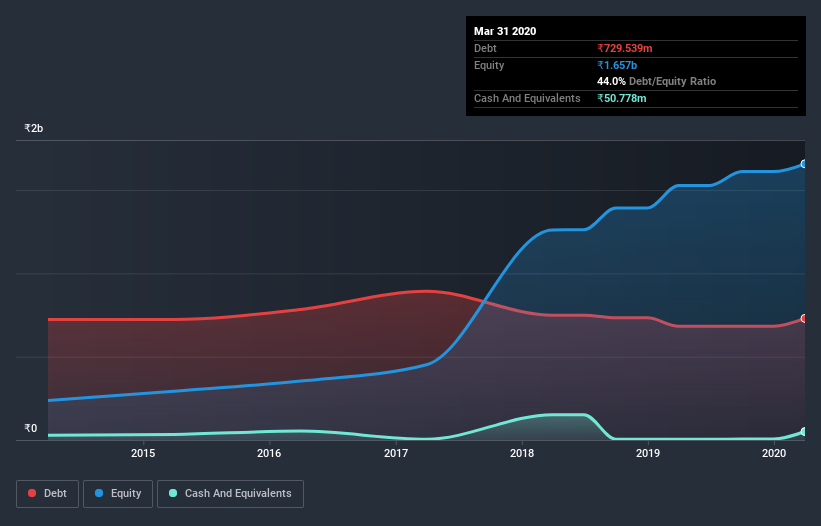- India
- /
- Paper and Forestry Products
- /
- NSEI:ASTRON
We Think Astron Paper & Board Mill (NSE:ASTRON) Is Taking Some Risk With Its Debt

David Iben put it well when he said, 'Volatility is not a risk we care about. What we care about is avoiding the permanent loss of capital.' So it seems the smart money knows that debt - which is usually involved in bankruptcies - is a very important factor, when you assess how risky a company is. We can see that Astron Paper & Board Mill Limited (NSE:ASTRON) does use debt in its business. But the real question is whether this debt is making the company risky.
Why Does Debt Bring Risk?
Generally speaking, debt only becomes a real problem when a company can't easily pay it off, either by raising capital or with its own cash flow. If things get really bad, the lenders can take control of the business. However, a more common (but still painful) scenario is that it has to raise new equity capital at a low price, thus permanently diluting shareholders. By replacing dilution, though, debt can be an extremely good tool for businesses that need capital to invest in growth at high rates of return. The first thing to do when considering how much debt a business uses is to look at its cash and debt together.
Check out our latest analysis for Astron Paper & Board Mill
What Is Astron Paper & Board Mill's Net Debt?
The image below, which you can click on for greater detail, shows that at March 2020 Astron Paper & Board Mill had debt of ₹729.5m, up from ₹682.3m in one year. However, it also had ₹50.8m in cash, and so its net debt is ₹678.8m.

How Healthy Is Astron Paper & Board Mill's Balance Sheet?
According to the last reported balance sheet, Astron Paper & Board Mill had liabilities of ₹1.40b due within 12 months, and liabilities of ₹227.2m due beyond 12 months. Offsetting this, it had ₹50.8m in cash and ₹994.8m in receivables that were due within 12 months. So its liabilities outweigh the sum of its cash and (near-term) receivables by ₹585.3m.
Astron Paper & Board Mill has a market capitalization of ₹1.80b, so it could very likely raise cash to ameliorate its balance sheet, if the need arose. But we definitely want to keep our eyes open to indications that its debt is bringing too much risk.
We measure a company's debt load relative to its earnings power by looking at its net debt divided by its earnings before interest, tax, depreciation, and amortization (EBITDA) and by calculating how easily its earnings before interest and tax (EBIT) cover its interest expense (interest cover). This way, we consider both the absolute quantum of the debt, as well as the interest rates paid on it.
Astron Paper & Board Mill's net debt is sitting at a very reasonable 1.9 times its EBITDA, while its EBIT covered its interest expense just 2.6 times last year. While these numbers do not alarm us, it's worth noting that the cost of the company's debt is having a real impact. Shareholders should be aware that Astron Paper & Board Mill's EBIT was down 39% last year. If that decline continues then paying off debt will be harder than selling foie gras at a vegan convention. When analysing debt levels, the balance sheet is the obvious place to start. But you can't view debt in total isolation; since Astron Paper & Board Mill will need earnings to service that debt. So when considering debt, it's definitely worth looking at the earnings trend. Click here for an interactive snapshot.
But our final consideration is also important, because a company cannot pay debt with paper profits; it needs cold hard cash. So we always check how much of that EBIT is translated into free cash flow. Over the last three years, Astron Paper & Board Mill reported free cash flow worth 4.6% of its EBIT, which is really quite low. For us, cash conversion that low sparks a little paranoia about is ability to extinguish debt.
Our View
Mulling over Astron Paper & Board Mill's attempt at (not) growing its EBIT, we're certainly not enthusiastic. But at least its net debt to EBITDA is not so bad. Looking at the bigger picture, it seems clear to us that Astron Paper & Board Mill's use of debt is creating risks for the company. If everything goes well that may pay off but the downside of this debt is a greater risk of permanent losses. When analysing debt levels, the balance sheet is the obvious place to start. However, not all investment risk resides within the balance sheet - far from it. For instance, we've identified 4 warning signs for Astron Paper & Board Mill (1 can't be ignored) you should be aware of.
When all is said and done, sometimes its easier to focus on companies that don't even need debt. Readers can access a list of growth stocks with zero net debt 100% free, right now.
If you decide to trade Astron Paper & Board Mill, use the lowest-cost* platform that is rated #1 Overall by Barron’s, Interactive Brokers. Trade stocks, options, futures, forex, bonds and funds on 135 markets, all from a single integrated account. Promoted
New: Manage All Your Stock Portfolios in One Place
We've created the ultimate portfolio companion for stock investors, and it's free.
• Connect an unlimited number of Portfolios and see your total in one currency
• Be alerted to new Warning Signs or Risks via email or mobile
• Track the Fair Value of your stocks
This article by Simply Wall St is general in nature. It does not constitute a recommendation to buy or sell any stock, and does not take account of your objectives, or your financial situation. We aim to bring you long-term focused analysis driven by fundamental data. Note that our analysis may not factor in the latest price-sensitive company announcements or qualitative material. Simply Wall St has no position in any stocks mentioned.
*Interactive Brokers Rated Lowest Cost Broker by StockBrokers.com Annual Online Review 2020
Have feedback on this article? Concerned about the content? Get in touch with us directly. Alternatively, email editorial-team@simplywallst.com.
About NSEI:ASTRON
Astron Paper & Board Mill
Manufactures and sells a range of kraft papers from waste paper for packaging industry in India.
Low and overvalued.
Similar Companies
Market Insights
Community Narratives



